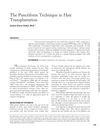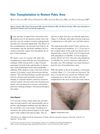4 citations,
January 2006 in “Indian Journal of Dermatology, Venereology and Leprology” Surgical hair restoration was the best permanent solution for baldness in 2005.
 4 citations,
May 2005 in “Seminars in Plastic Surgery”
4 citations,
May 2005 in “Seminars in Plastic Surgery” Carlos Oscar Uebel developed a hair transplant method that looks natural, has low risk, and shows full growth in 6-12 months.
 4 citations,
June 2003 in “Fertility and Sterility”
4 citations,
June 2003 in “Fertility and Sterility” Finasteride doesn't affect ovulation in normal women.
 4 citations,
May 2002 in “Aesthetic Surgery Journal”
4 citations,
May 2002 in “Aesthetic Surgery Journal” A new hair loss classification for women improves treatment, but careful patient selection is crucial for successful hair transplantation.
 4 citations,
April 2000 in “Plastic and Reconstructive Surgery”
4 citations,
April 2000 in “Plastic and Reconstructive Surgery” The document suggests fixing common hair transplant issues by combining artistic principles with plug reduction, recycling, and additional micrograft transplantation, while also potentially using arnica to help with post-operative swelling.
 3 citations,
January 2023 in “Materials horizons”
3 citations,
January 2023 in “Materials horizons” The new biomaterial helps grow blood vessels and hair for skin repair.
 3 citations,
May 2022 in “JAAD case reports”
3 citations,
May 2022 in “JAAD case reports” A woman developed alopecia after her second Pfizer vaccine but regrew her hair with treatment and had no issues after a booster shot.
 3 citations,
May 2022 in “Clinical and experimental dermatology”
3 citations,
May 2022 in “Clinical and experimental dermatology” Drugs targeting EMT molecules show promise for treating lichen planopilaris.
3 citations,
November 2021 in “Frontiers in Medicine” Advanced male pattern baldness affects the back of the scalp, reducing hair follicles.
 3 citations,
November 2021 in “Journal of The American Academy of Dermatology”
3 citations,
November 2021 in “Journal of The American Academy of Dermatology” Androgenetic alopecia, a genetic disorder affecting up to 50% of adults, is caused by an excessive response to androgens leading to hair follicle shrinkage. Treatments include FDA-approved drugs, other therapies like low-dose oral minoxidil, and hair transplantation.
3 citations,
November 2021 in “Clinical, Cosmetic and Investigational Dermatology” Autologous cellular micrografts improve hair density and thickness in the short term for androgenetic alopecia.
 3 citations,
October 2021 in “Indian Journal of Plastic Surgery”
3 citations,
October 2021 in “Indian Journal of Plastic Surgery” Strip harvest hair transplants produce natural-looking results and have a high success rate with minimal damage to hair follicles.
 3 citations,
January 2021 in “Applied sciences”
3 citations,
January 2021 in “Applied sciences” Fermented red ginseng and a traditional herb mix improved hair growth in mice.
 3 citations,
January 2021 in “Hair transplant forum international”
3 citations,
January 2021 in “Hair transplant forum international” The Hair Diameter Index (HDI) was created to help plan hair restoration surgery after finding that visual hair density is linked to hair count and thickness, not volume.
 3 citations,
May 2020 in “bioRxiv (Cold Spring Harbor Laboratory)”
3 citations,
May 2020 in “bioRxiv (Cold Spring Harbor Laboratory)” The unique coat of lykoi cats is likely caused by new variants in the Hairless gene.
 3 citations,
April 2020 in “Facial Plastic Surgery Clinics of North America”
3 citations,
April 2020 in “Facial Plastic Surgery Clinics of North America” Beard hair transplantation is generally satisfying, requires 250-800 grafts, uses FUE to avoid scars, needs careful planning, has some risks, and hair regrowth starts after 4-6 months.
 3 citations,
August 2019 in “International Journal of Dermatology”
3 citations,
August 2019 in “International Journal of Dermatology” Dermoscopy is useful for diagnosing lichen planopilaris and certain features may relate to disease duration, age, and gender.
 3 citations,
January 2019 in “Skin Research and Technology”
3 citations,
January 2019 in “Skin Research and Technology” Frequent use of hair straighteners can cause hair loss similar to scarring alopecia in young Turkish women.
 3 citations,
November 2018 in “Hair transplant forum international”
3 citations,
November 2018 in “Hair transplant forum international” Using body hair with scalp hair for hair transplants improves density and coverage in severe hair loss cases.
 3 citations,
October 2017 in “Journal of Cosmetic Dermatology”
3 citations,
October 2017 in “Journal of Cosmetic Dermatology” Dr. Muhammad Ahmad created a hair classification system to help improve hair restoration surgery outcomes.
3 citations,
September 2017 in “Archives of dermatological research” Early diagnosis and tailored treatments are crucial for managing ichthyosis syndromes with hair abnormalities.
3 citations,
August 2017 in “Clinical case reports” A rare skin condition causes red and dark patches on the face and limbs.
 3 citations,
April 2015 in “International research journal of pharmacy”
3 citations,
April 2015 in “International research journal of pharmacy” Gentamicin penetrates pig skin better through open hair follicles than blocked ones.
 3 citations,
March 2014 in “Veterinary dermatology”
3 citations,
March 2014 in “Veterinary dermatology” Norwegian puffin dogs have a unique type of hair loss that often doesn't get better on its own and responds well to ciclosporin treatment.
 3 citations,
April 2011 in “Dermatologic Surgery”
3 citations,
April 2011 in “Dermatologic Surgery” Different women have various natural hairline shapes, and understanding this is important for designing hair transplants.
 3 citations,
August 2010 in “Anais brasileiros de dermatologia/Anais Brasileiros de Dermatologia”
3 citations,
August 2010 in “Anais brasileiros de dermatologia/Anais Brasileiros de Dermatologia” A rare genetic disease caused severe, worsening hair loss from early childhood with poor treatment results.
 3 citations,
December 2008 in “The American Journal of Cosmetic Surgery”
3 citations,
December 2008 in “The American Journal of Cosmetic Surgery” Hair transplantation has evolved to refined techniques like FUE and FUT, with Finasteride and Minoxidil as the only other proven treatments for hair loss.
 3 citations,
December 2007 in “Dermatologic Surgery”
3 citations,
December 2007 in “Dermatologic Surgery” Hair transplantation successfully restored a woman's pubic hair with natural-looking results and few complications.
 3 citations,
February 2005 in “Aktuelle Dermatologie”
3 citations,
February 2005 in “Aktuelle Dermatologie” Prolactin and TGF-β receptor blockers might help treat hair loss.
 3 citations,
September 2002 in “Dermatologic Surgery”
3 citations,
September 2002 in “Dermatologic Surgery” The evaluation system improved patient selection for hair loss surgery, leading to better results and satisfaction.
























